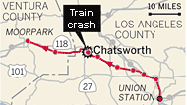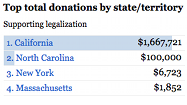Maria C. Ashton
A 3rd grade teacher at South Park Elementary in 2010
These graphs show a teacher's "value-added" rating based on his or her students' progress on the California Standards Tests in math and English. The Times’ analysis used all valid student scores available for this teacher from the 2003-04 through 2009-10 academic years. The value-added scores reflect a teacher's effectiveness at raising standardized test scores and, as such, capture only one aspect of a teacher's work.


Math effectiveness


English effectiveness
About this rating
The red lines show The Times’ value-added estimates for this teacher. Ashton falls within the “average” category of district teachers in math and within the “least effective” category in English. These ratings were calculated based on test scores from 114 students.
Because this is a statistical measure, each score has a degree of uncertainty. The shading represents the range of values within which Ashton’s actual effectiveness score is most likely to fall. The score is most likely to be in the center of the shaded area, near the red line, and less likely in the lightly shaded area. Teachers with ratings based on a small number of student test scores will a have wider shaded range.
The beige area shows how the district's 11,500 elementary school teachers are distributed across the categories.
Ashton's LAUSD teaching history
Years used for value-added rating. See FAQ for details.
- South Park Elementary, 2010 - 2006
Maria Ashton's Response:

I have five years of scores considered in this "value added" system. I concede that is is likely that I was not highly effective my first year or two. I do however know that my third and forth year of teaching over fifty percent of my students test scores increased or remained proficient or advanced. Maybe this is not enough to be highly effective according to the LA Times but it sure was effective for those children. In addition, I know the Times claims that there is no need to control for race or socioeconomic status, but a 2010 Study conducted by Stanford University and Berkley said differently. It claimed that the races of the children in the "value added" scores could effect the overall effectiveness rating. My career began at a school where 100% of the students were socioeconomically disadvantaged and all minorities, and I'm sorry Times, but no matter what you claim, that does matter. Finally, last year I began with a fourth and fifth grade combination class, by November I was renormed into a substitute position and then in January given a class of the school's 22 lowest scoring FBB students as an intervention. I worked with them until May when I left for maternity leave and the students tested with another teacher. I don't even know which group of children that I taught last year is even included in my "value added" score. Whichever children it was did not receive my instruction for more than three months in total, but I have their test scores to exclusively represent my test scores and effectiveness as an educator. How do you control for that Times? At the end of the day, you can keep printing "value added" scores. You can even contend that they define a teacher, however those of us that actually work in a classroom everyday know that simply cannot accurately represent the real effectiveness of a teacher. I know people want data, and statistics, and numbers to crunch. Well perhaps less people could focus their time or arbitrary measures that include only a snapshot of a teachers impact, and more time focusing on figuring out ways to keep even us "least effective" teachers from being fired every year.
![]() The Times gave LAUSD elementary school teachers rated in this database the opportunity to preview their value-added evaluations and publicly respond. Some issues raised by teachers may be addressed in the FAQ. Teachers who have not commented may do so by contacting The Times.
The Times gave LAUSD elementary school teachers rated in this database the opportunity to preview their value-added evaluations and publicly respond. Some issues raised by teachers may be addressed in the FAQ. Teachers who have not commented may do so by contacting The Times.
|
|
 Delicious
Delicious
|
 Digg
Digg
|
 Facebook
Facebook
|
 Twitter
Twitter
|









